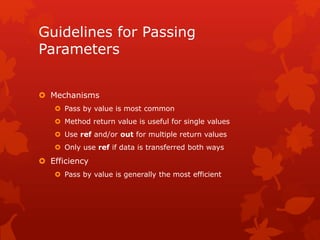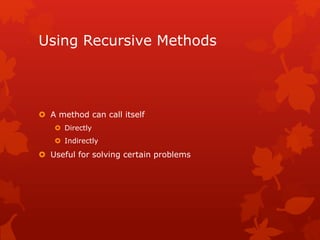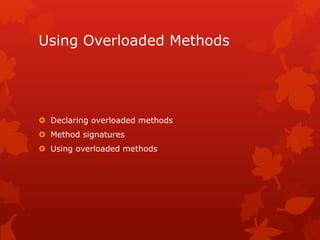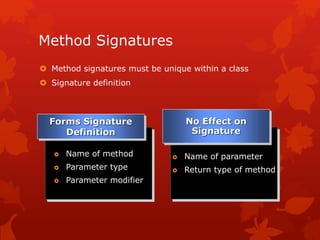Module 4 : methods & parameters
- 2. Overview Using Methods Using Parameters Using Overloaded Methods
- 3. Using Methods Defining Methods Calling Methods Using the return Statement Using Local Variables Returning Values
- 4. Defining Methods Main is a method Use the same syntax for defining your own methods using System; class ExampleClass { static void ExampleMethod( ) { Console.WriteLine("Example method"); } static void Main( ) { // ... } }
- 5. Calling Methods After you define a method, you can: Call a method from within the same class Use method’s name followed by a parameter list in parentheses Call a method that is in a different class You must indicate to the compiler which class contains the method to call The called method must be declared with the public keyword Use nested calls Methods can call methods, which can call other methods, and so on
- 6. Using the return Statement Immediate return Return with a conditional statement static void ExampleMethod( ) { int numBeans; //... Console.WriteLine("Hello"); if (numBeans < 10) return; Console.WriteLine("World"); }
- 7. Using Local Variables Local variables Created when method begins Private to the method Destroyed on exit Shared variables Class variables are used for sharing Scope conflicts Compiler will not warn if local and class names clash
- 8. Returning Values Declare the method with non-void type Add a return statement with an expression Sets the return value Returns to caller Non-void methods must return a value static int TwoPlusTwo( ) { int a,b; a = 2; b = 2; return a + b; } int x; x = TwoPlusTwo( ); Console.WriteLine(x);
- 9. Using Parameters Declaring and Calling Parameters Mechanisms for Passing Parameters Pass by Value Pass by Reference Output Parameters Using Variable-Length Parameter Lists Guidelines for Passing Parameters Using Recursive Methods
- 10. Declaring and Calling Parameters Declaring parameters Place between parentheses after method name Define type and name for each parameter Calling methods with parameters Supply a value for each parameter static void MethodWithParameters(int n, string y) { ... } MethodWithParameters(2, "Hello, world");
- 11. Mechanisms for Passing Parameters Three ways to pass parameters in Pass by value in out Pass by reference out Output parameters
- 12. Pass by Value Default mechanism for passing parameters: Parameter value is copied Variable can be changed inside the method Has no effect on value outside the method Parameter must be of the same type or compatible type static void AddOne(int x) { x++; // Increment x } static void Main( ) { int k = 6; AddOne(k); Console.WriteLine(k); // Display the value 6, not 7 }
- 13. Pass by Reference What are reference parameters? A reference to memory location Using reference parameters Use the ref keyword in method declaration and call Match types and variable values Changes made in the method affect the caller Assign parameter value before calling the method
- 14. Output Parameters What are output parameters? Values are passed out but not in Using output parameters Like ref, but values are not passed into the method Use out keyword in method declaration and call static void OutDemo(out int p) { // ... } int n; OutDemo(out n);
- 15. Using Variable-Length Parameter Lists Use the params keyword Declare as an array at the end of the parameter list Always pass by value static long AddList(params long[ ] v) { long total, i; for (i = 0, total = 0; i < v.Length; i++) total += v[i]; return total; } static void Main( ) { long x = AddList(63,21,84); }
- 16. Guidelines for Passing Parameters Mechanisms Pass by value is most common Method return value is useful for single values Use ref and/or out for multiple return values Only use ref if data is transferred both ways Efficiency Pass by value is generally the most efficient
- 17. Using Recursive Methods A method can call itself Directly Indirectly Useful for solving certain problems
- 18. Using Overloaded Methods Declaring overloaded methods Method signatures Using overloaded methods
- 19. Declaring Overloaded Methods Methods that share a name in a class Distinguished by examining parameter lists class OverloadingExample { static int Add(int a, int b) { return a + b; } static int Add(int a, int b, int c) { return a + b + c; } static void Main( ) { Console.WriteLine(Add(1,2) + Add(1,2,3)); } }
- 20. Method Signatures Method signatures must be unique within a class Signature definition Name of method Parameter type Parameter modifier Forms Signature Definition Name of parameter Return type of method No Effect on Signature
- 21. Using Overloaded Methods Consider using overloaded methods when: You have similar methods that require different parameters You want to add new functionality to existing code Do not overuse because: Hard to debug Hard to maintain
- 22. Review Using Methods Using Parameters Using Overloaded Methods




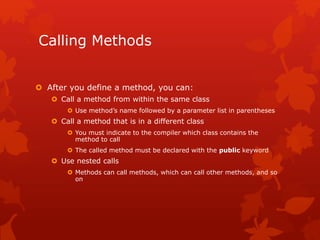



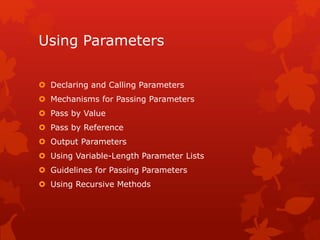




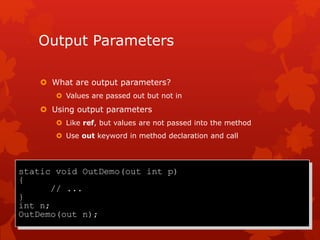
![Using Variable-Length Parameter
Lists
Use the params keyword
Declare as an array at the end of the parameter list
Always pass by value
static long AddList(params long[ ] v)
{
long total, i;
for (i = 0, total = 0; i < v.Length; i++)
total += v[i];
return total;
}
static void Main( )
{
long x = AddList(63,21,84);
}](https://image.slidesharecdn.com/4methodsparameters-190503053204/85/Module-4-methods-parameters-15-320.jpg)
